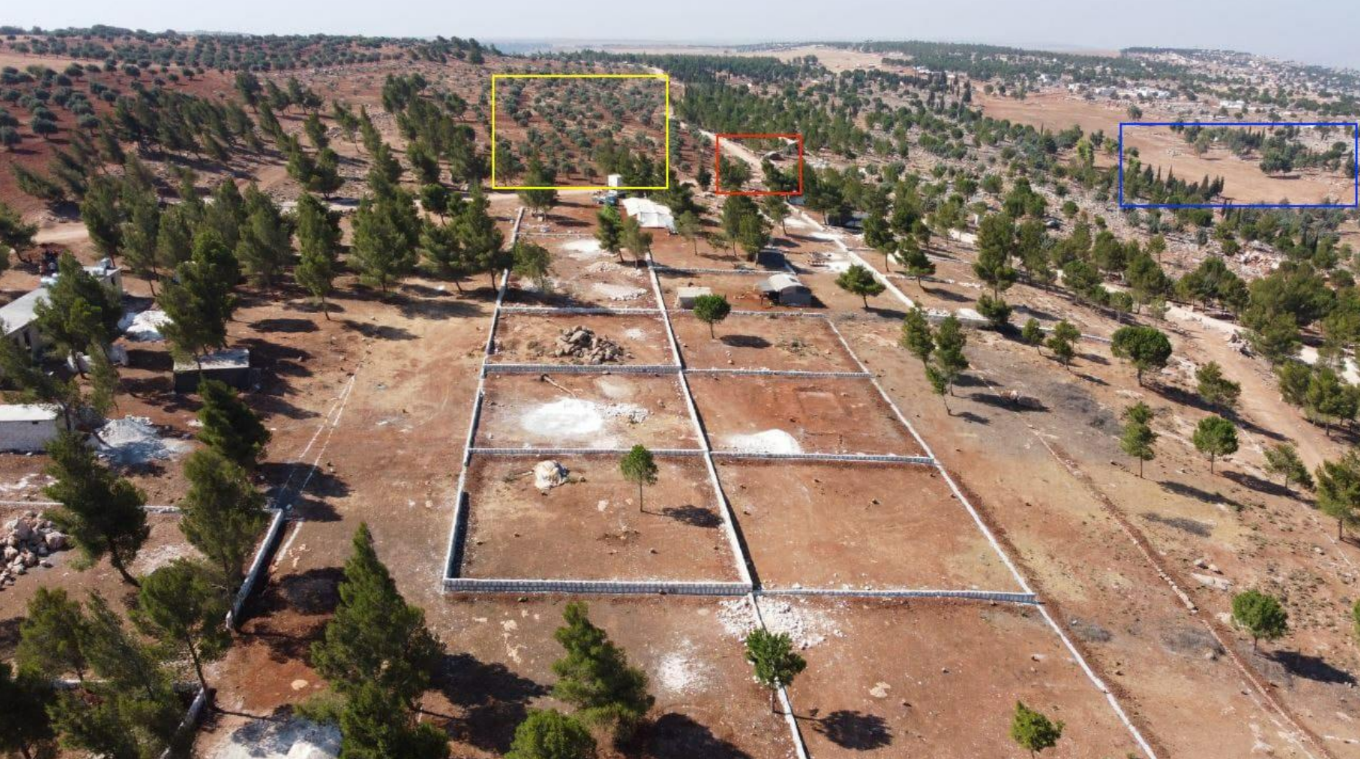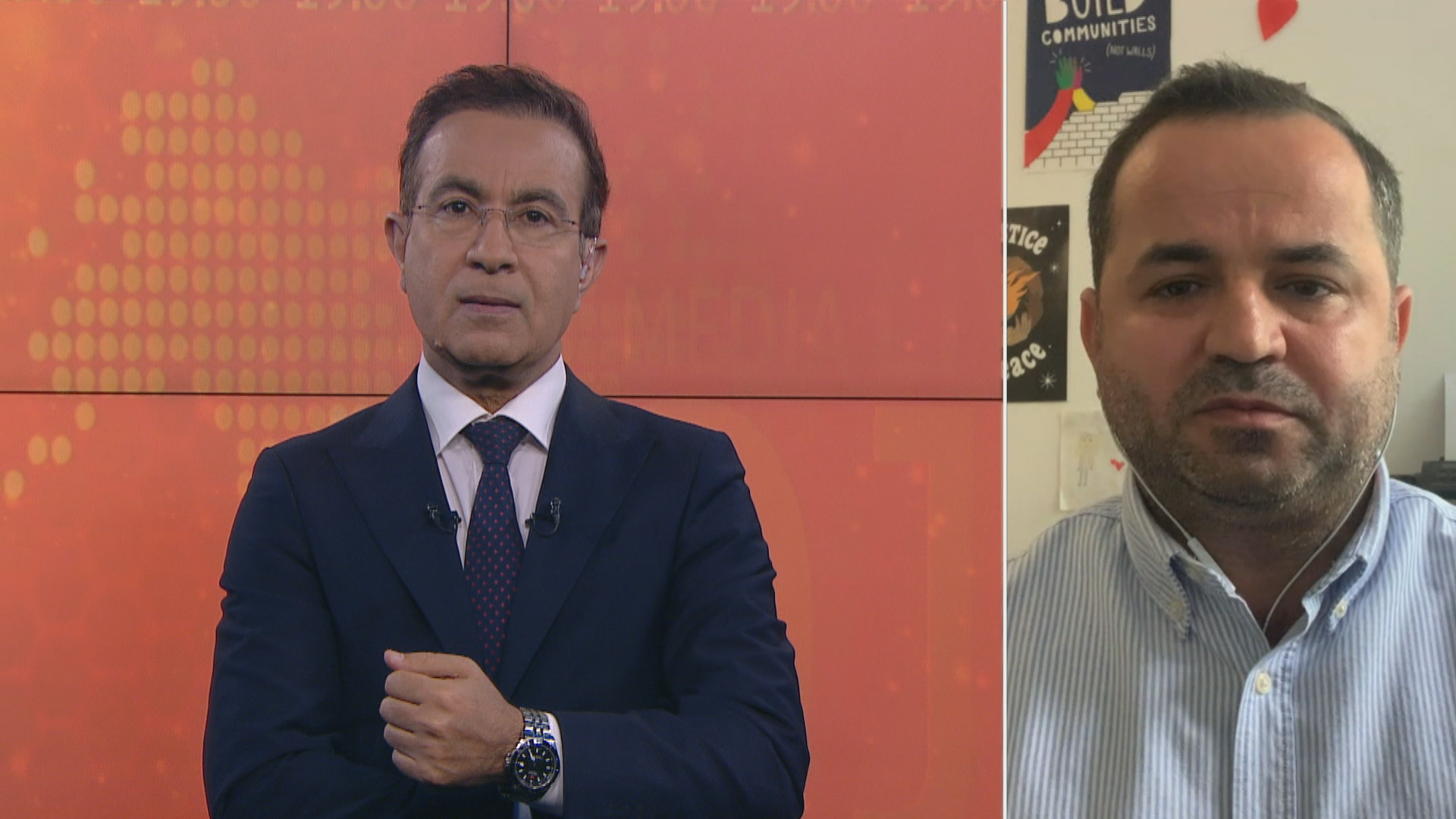
Satellite view of a settlement in the Kurd Mountains built for SNA fighters on March 28, 2022. Photo: STJ
ERBIL, Kurdistan Region - Since the January 2018 Turkish invasion of the city of Afrin, the Kurdish population of the city has drastically declined. Threats from Turkish-backed Syrian militias occupying the city have exacerbated the exodus of Kurds from a city once known for its diversity. A report published by the Syrians for Truth and Justice (STJ) organization on Wednesday sheds light on the forced demographic change.
STJ is an independent, non-governmental organization documenting human rights violations perpetrated against Syrians in Syria. The France-based organization describes itself as striving for a Syria where all citizens have dignity, equality, and justice.
The report - titled "Residential settlements in Afrin: Demographic engineering plans or projects to shelter the displaced" - highlights issues caused following the Turkish invasion of Afrin, when several factions of the Turkish-backed opposition Syrian National Army (SNA) established Baya, a large human settlement built to house fighters of the militia and their families in Afrin, a region historically dominated by Kurds. The residential complex is built at the foothills of the Kurd-Dagh, or Kurd Mountains, a highland region overlooking the city of Afrin.
"Testimonies obtained by STJ indicated that the governor of the Turkish state of Hatay, Rahmi Dogan, is one of the direct officials responsible for building the settlements by giving the green light to a number of local and international organizations to start building the gathering at the foot of the mountains," the report reads.

The aforementioned organizations are responsible for the provision of public services for the militants' families, and also play a hand in the construction of the settlements. The report states that their "role has gone beyond providing 'public services' to the families of fighters, to building entire villages."
According to the report, the main beneficiaries of the project are nine factions affiliated with the Ankara-backed SNA, and are led by Mohanad al-Khalaf, an individual with backing from local clerics who played a major role in dividing the area required for the settlement and the distribution of land.
The Turkish Humanitarian Relief Foundation (IHH), a non-governmental group, provided financial aid among various other necessities to the beneficiaries, and the report indicates that the organization provided each settler with building materials estimated at around $1,000.
IHH previously said it has supported the construction of more than 18,000 residential units in northern Syria since 2019, and an IHH secretary in February said that more than 50,000 people have settled in the houses built by the organization, with that number expected to have doubled by April following the building of an additional 24,325 homes.
The report also "reveals a number of violations of the laws of the occupation in northwestern Syria, which hold Turkey as an occupying power ... and the allocation agreement licenses who hold the interests of the SNA factions over the interests of the civilians."
STJ further criticized Turkey for "resettling Syrians displaced from other parts of the country and displacing the population and the widespread Kurdish culture in Afrin," accusing Ankara of illegally occupying Afrin, seizing the property of civilians, and making a return of the original population difficult.

Khalaf originally pitched the idea of building such settlements as a means "to build permanent homes for the fighters of the [SNA] factions and to move them to the Afrin region" in order to establish a stronghold there; a move that resulted in demographic change as well as the seizure and non-return of property from its original inhabitants.
The report explains that the Turkish-built residential settlements contain all forms of necessities, including schools, mosques, hospitals, police stations, gardens, and water wells, essentially making them cities in their own right.
"According to the engineering plan, an area of 100 square meters has been allocated to each housing unit consisting of three rooms with utilities and a private water tank," the report claims, adding that construction on the housing units was initiated in 2020 and is still ongoing.
In addition to Turkish-funded settlements, the report mentions another residential complex in Afrin built by Kuwaiti-backed Sham al-Khair Humanitarian Organization, licensed by Ankara, and located in the city's countryside where it consists of more than 300 houses and vital facilities. The settlement is named Kuwait al-Rahma village.

Regarding monthly food aid or reconstruction costs, a source from one of the rebel factions on the condition of anonymity told STJ that the SNA factions rely on "collecting donations locally or from other countries, especially the Arab Gulf countries."
The report yet again addressed the seizure of Kurdish land in the Afrin area. It mentioned that fighters within the Suleiman Shah Brigade seized the majority Kurdish Sheikh al-Hadid district in Afrin, before expelling its original residents and settling in the area, with funding from IHH.
STJ called on the United Nations Security Council and European Union countries to take action against attempts of "Arabization" in the city of Afrin and other parts of Syria and expel the local population.
Bassam Alahmad, co-founder & executive director of STJ told Rudaw’s Dilbxwin Dara on Monday that following the invasion of Afrin, “tens of thousands of fighters from the opposition and their families were moved in. This is in addition to tens of thousands of civilians [who were moved to Afrin],” he said, adding that these people have been settled in different parts of Afrin.
He also said that their findings have been sent to countries, including European countries, “which financially support” the settlements.
Regarding obstacles the organization faces when documenting the violations, Alahmad said “they are mostly security obstacles. The indigenous residents [of Afrin] are under pressure . The main obstacles are related to a strong and dangerous security pressure against the indigienous people.”
He blamed some Kurdish groups for denying the violations without naming any group.
He said it is “technically very difficult” for the UN fact-finding teams to visit Afrin because “they need approval from the Syrian government to visit these areas,” adding that even when they do visit the area the violations are “concealed.”

Afrin was a Kurdish-majority region in northern Syria. The People's Protection Units (YPG), a Kurdish force, took control of the area after Syrian regime forces withdrew from the north of the country at the start of the Syrian uprising in 2011.
Turkey in January 2018 alongside its allied Syrian militias launched Operation Olive Branch in Afrin, invading the city two months later, forcefully displacing much of the local population. The United Nations has accused Ankara of committing possible war crimes against the local population, with Turkey pointing fingers at the YPG for several deadly explosions in the city.
The YPG is a Kurdish armed force in northern Syria. Turkey considers it to be the Syrian offshoot of the Kurdistan Workers' Party (PKK), an armed group fighting for the increased rights of Kurds in Turkey and designated a terrorist organization by Ankara. The YPG's alleged links to the PKK have been used as a pretext by Turkey for multiple military operations across the border into northern Syria
In late May, Turkish President Recep Tayyip Erdogan announced a new military offensive into northern Syria to create a 30-kilometer "safe zone" along Turkey's southern border. It is aimed to push back Kurdish fighters from the area. Erdogan said the operation aims to clear Tal Rifaat and Manbij from "terrorists."
Syria and the international community, including the US, Russia, and the United Nations, have all urged Turkey to refrain from embarking on yet another military escalation in Rojava. US State Department spokesperson Ned Price responded to Rudaw's Roj Eli Zalla's questioning about the incursion during a weekly press briefing earlier this week, reiterating US concern about the military escalation, especially its impact on the local population.
Updated on June 8, 2022 at 5:20 with comments from Bassam Alahmad








Comments
Rudaw moderates all comments submitted on our website. We welcome comments which are relevant to the article and encourage further discussion about the issues that matter to you. We also welcome constructive criticism about Rudaw.
To be approved for publication, however, your comments must meet our community guidelines.
We will not tolerate the following: profanity, threats, personal attacks, vulgarity, abuse (such as sexism, racism, homophobia or xenophobia), or commercial or personal promotion.
Comments that do not meet our guidelines will be rejected. Comments are not edited – they are either approved or rejected.
Post a comment